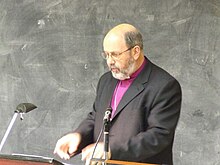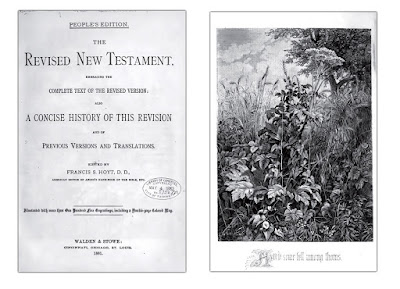This day in history: Nicholas Thomas Wright FRSE was born on this day in 1948. N. T. Wright (or Tom Wright) is an English New Testament scholar, Pauline theologian and Anglican bishop. He was the bishop of Durham from 2003 to 2010. He then became research professor of New Testament and Early Christianity at St Mary's College in the University of St Andrews in Scotland until 2019, when he became a senior research fellow at Wycliffe Hall at the University of Oxford.
If you're a Bible collector like myself, then you know N.T. Wright for his criticism of the New International Version Bible. He wrote:
"In this context, I must register one strong protest against one particular translation. When the New International Version was published in 1980, I was one of those who hailed it with delight. I believed its own claim about itself, that it was determined to translate exactly what was there, and inject no extra paraphrasing or interpretative glosses. This contrasted so strongly with the then popular New English Bible, and promised such an advance over the then rather dated Revised Standard Version, that I recommended it to students and members of the congregation I was then serving. Disillusionment set in over the next two years, as I lectured verse by verse through several of Paul's letters, not least Galatians and Romans. Again and again, with the Greek text in front of me and the NIV beside it, I discovered that the translators had another principle, considerably higher than the stated one: to make sure that Paul should say what the broadly Protestant and evangelical tradition said he said. I do not know what version of scripture they use at Dr Piper's church. But I do know that if a church only, or mainly, relies on the NIV it will, quite simply, never understand what Paul was talking about." Wright, N. T. (2009). Justification : God's Plan and Paul's Vision. Downers Grove, Illinois: IVP Academic. pp. 51–52. ISBN 978-0-8308-3863-9.
This criticism is echoed by many others.
James Barr, in Modern English Bible Versions as a Problem for the Church_ Quarterly Review/Fall 1994 writes:
"But this was not the end of the story. If on the one hand the conservative acceptance of the RSV as usable betokened a certain willingness to work along with the main currents of Christendom, there still existed the impulse to evangelical separatism, the unwillingness to do anything or accept anything that was not totally and purely "evangelical." The most important manifestation of this latter tendency is the so-called NIV, or New International Version, (New Testament, 1973; whole Bible, 1978).
The preface to this version begins with one of the most whopping falsehoods ever to be written into a Bible version by a group of 'Bible believers' such as the promoters of the version were, for it says that the people who worked on the version came from many denominations and this 'helped to safeguard the translation from sectarian bias.' The contrary is the case; the NIV was a sectarian project from the beginning. It was, as it itself says, planned by committees of the Christian Reformed Church and the National Association of Evangelicals. The name International, as is well known to anyone experienced in the literature, is a code word meaning 'acceptable for conservatives and fundamentalists.' The reason for the existence of the NIV is not, and never was, that it was in any way better, or had better principles of translation, or better scholarship behind it, or that it had solved the problem of style as between archaic 'biblical' style and conversational "modern" style. Its reason for existence was purely and simply that it was produced by and for evangelicals and for them only."
One website, Poor and Misleading Translation in the New International Version (NIV) documents each error. It starts off by saying: "The...NIV translators, in many of the passages that challenged their doctrines and belief in inerrancy,...change(d) the Bible itself — altering the offending words and phrases to say what they think it ought to have said. In most cases of mistranslated NIV passages, there is a clear 'problem' with the original text related either to doctrine or to biblical inerrancy."



